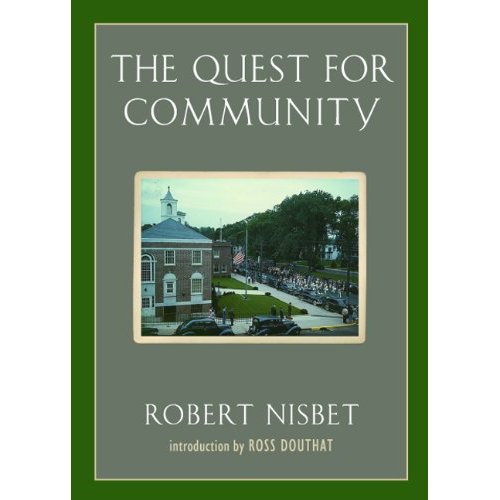 I finished reading Robert Nisbet’s classic book, The Quest for Community. I believe one of the most tragic facts of the twentieth century is the systematic destruction of community. Community is essential for the well-being of a civilization, for without community, people become less than human. Communities, however, are only free if people can voluntarily choose to participate. Statist communities lack this vital freedom of choice. The Life Business helps improve people both personally and professionally within leadership communities. A person will grow much faster if he has a community in which to apply his leadership lessons. Here is a summary of Nisbet’s writings from the Stanford Review by Ben Guthrie. Sincerely, Orrin Woodward
I finished reading Robert Nisbet’s classic book, The Quest for Community. I believe one of the most tragic facts of the twentieth century is the systematic destruction of community. Community is essential for the well-being of a civilization, for without community, people become less than human. Communities, however, are only free if people can voluntarily choose to participate. Statist communities lack this vital freedom of choice. The Life Business helps improve people both personally and professionally within leadership communities. A person will grow much faster if he has a community in which to apply his leadership lessons. Here is a summary of Nisbet’s writings from the Stanford Review by Ben Guthrie. Sincerely, Orrin Woodward
Nisbet, a communitarian who opposes statism, does not laud individualism either. For those unfamiliar with the intellectual roots of conservatism, this position may seem curious for a conservative to hold. But a communitarian ethos permeates conservatism. Nisbet views atomistic individualism as a negative force in society because “Individualism has resulted in masses of normless, unattached, insecure individuals who lose even the capacity for independent, creative living” (12). People are social creatures and depend upon communities and social structures for moral certitude. For Nisbet, the two prerequisites for community are function and authority. He defines community as the “product of people working together on problems, of autonomous and collective fulfillment of internal objectives, and of the experience of living under codes of authority which have been set in large degree by the persons involved”.
Nisbet’s analysis proceeds as a descriptive assessment of the loss of community in the modern world and the lack of emergence of suitable intermediate associations to intercede between the individual and the state. It is not that traditional forms of community, based on kinship, faith, or locality have ceased to exist, but rather they have lost functional significance. Nisbet writes, “Family, local community, church, and the whole network of informal interpersonal relationships have ceased to play a determining role in our institutional systems of mutual aid, welfare, education, recreation, and economic production and distribution” (48). In lacking functional significance, communities lose the ability to provide psychological sustenance of “allegiance, belief, and incentive” to individuals. . .
Nisbet effectively shows that liberal individualism and authoritarian statism are not incompatible doctrines, but can in fact combine to form a lethal combination of totalitarianism. The safeguard against totalitarianism is a rich cultural fabric of intermediate associations – family, profession, local community, church, university, trade union, cooperative, and mutual aid association. Interestingly, Nisbet does not extensively discuss the internal content of the intermediate associations. He appears to be somewhat indifferent on the types of institutions which should prevail, so long as some functionally significant institutions prevail. Even for an important institution like the family, Nisbet appears laissez-faire in his suggestion that there “is no single type of family, any more than there is a single type of religion, that is essential to personal security and collective prosperity” (62). The lessons about the importance of community do not purely defend against creeping totalitarianism; the lessons extend to the more positive promotion of freedom.
Nisbet continues in the third part of his analysis on community and the problem of freedom, “Genuine freedom is not based upon the negative psychology of release. Its roots are in positive acts of dedication to ends and values” (238). Nisbet believes in the necessity of voluntary intermediate organizations both for the protection of individuals and for human flourishing. Since community is characterized by authority and function, it might seem paradoxical to suggest that individuals are freer when they have joined an organization to which they have submitted to an authority. But authority is a necessary component of a functional community, which is necessary for the psychological well being of individuals. The key for Nisbet is that the authority is not absolute. Freedom “lies in the interstices of authority” (239). An individual must always have recourse to leave an organization and join a different one.
Nisbet concludes his analysis with a call for a “new philosophy of laissez faire,” one in which “the basic unit will be the social group” rather than the individual (247). The values which Nisbet extols are freedom of choice, cultural diversity, pluralism, and division of authority. Robert Nisbet fits well in the traditionalist branch of conservatism, but in some ways Nisbet’s views are not incompatible with the libertarian strain of conservatism. He clearly argues that a viable free market must be embedded in social institutions, as he writes, “Capitalism is either a system of social and moral allegiances, resting securely in institutions and voluntary associations, or it is a sand heap of disconnected particles of humanity” (215). But the emphasis on voluntary associations recognizes the primacy of liberty and individual choice, given that individuals are members of strong communities.







